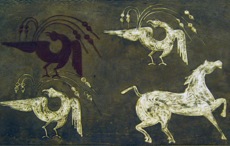Hai Ren


TEACHING STATEMENT
My teaching philosophy is underpinned by three fundamental principles. First, I am firmly committed to independent thinking, including encouraging students to take an active role in the classroom and employ creativity in solving problems. Thus, I adopt a research- and inquiry-based pedagogy that includes research papers and course presentations. My course syllabi, especially seminars and special topics, tend to be organized on the basis of a series of important questions and debates. This pedagogy is intended to show the students how a systematic inquiry works. In all my courses, I make efforts to ensure students express their own opinions and demonstrate their own understandings of course materials. These are usually done through presentations. In a typical presentation, a student summarizes and presents the main arguments of selected readings (one or two book chapters/articles) assigned for a particular date, and then asks two questions for class discussion. Other students learn from their classmate and find out whether they can answer the asked questions. In the end, I give a brief assessment of the student’s performance and suggest the student contact me for a detailed feedback, either in person or via email. During my lectures, I make sure to address important issues missed or misunderstood by students, as shown in their presentations.
Second, my teaching methods vary according to different learning contexts and situations. I believe this principle is especially important at the University of Arizona, a public university serving the state’s diverse populations. I pay close attention to individual learning styles among the students, both at the undergraduate and the graduate levels. Regarding paper topics, I not only outline the general requirements applicable to all students, but I also let the students know that I permit them to work with me to create their own questions that are based on their own strengths and interests. By the end of a semester, I require students to write a self-evaluation to assess what they have learned and how they might apply in their future careers. This assignment is designed to cultivate their self-reflexive ability and appreciate their individual learning outcomes. As I read their self-evaluations at the end of each semester, I learn how the students evaluate themselves critically and objectively to get a concrete sense about the aspects of the course from which they learn the most. This exercise offers a useful tool for course assessment. In addition, I encourage students to visit my office hours so that I could address their individual concerns.
Third, my teaching focuses on developing both intellectual and practical skills such as formulating research questions, conducting research, analyzing collected information, and communicating effectively in speech and writing. In general, my lectures tend to encourage students to pay attention to connections among different parts in a course. I begin with an introduction of major questions and issues for a course and end with a summary that always refers back to the introduction. I remind the students what they have accomplished through a semester. In my courses, I make sure that a student’s final grade represents the results of a range of learning activities that involve the above skills. A course syllabus clearly outlines all assignments, including papers, reading journals, exams, presentations, course participation, and self-evaluation. The weekly journals both help students to follow the readings throughout a semester and refine their note-taking skills. Course presentations in front of a whole class foster the students’ public speaking skills. I also encourage students to use widely available presentation tools such as Microsoft PowerPoint.
My courses focus on Chinese popular culture, media studies, and cultural anthropology. They cover multiple levels, from general education, upper division to graduate. The following is a list of my courses:
ANTH599 Independent Study
CHN 245 Chinese Popular Culture
CHN/ENG 429/529 Chinese Immigration Literature and Film
CHN/ANTH 410A/510A Ethnic Diversity in China
CHN/ANTH 410B/510B The Anthropology of Contemporary China
CHN 444/544 Chinese Media & Culture
CHN/HIST 476/576 Modern China
CHN 599 Independent Study
CHN 799 Independent Study
EAS/HIST 270 Modern East Asia
EAS 280 Gender, Sexuality, and Asia
EAS 456/556 Humanities and the Global Creative Economy
EAS 496C/596C Special Topic on “Consumption, Popular Culture, and Social Justice in China”
EAS 496C/596C Special Topic on “Chinese Popular Culture”
EAS 496C/596C Special Topic on “Global China”
EAS 496C/596C Special Topic on “Ethnography of Contemporary China”
HUMS 456/556 Humanities and the Global Creative Economy